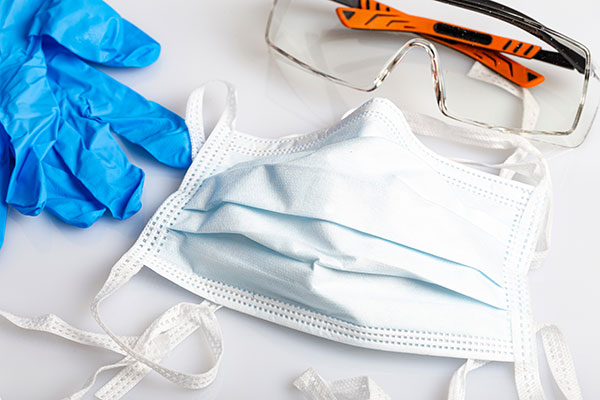How Dental Offices Are Adhering to Infection Control During COVID-19
In light of recent events regarding the COVID-19 outbreak, there is a need to understand how dental offices are meeting infection control guidelines. The Centers for Disease Control and Prevention (CDC) has updated its situation report about the Coronavirus virus. Based on CDC guidelines, the American Dental Association (ADA) has provided a detailed handout for dental professionals on how to handle patient assessment and adhere to infection control measures.
Infection control measures
Dental offices are paying attention to infection control now more than ever, considering how easily the disease spreads. Dental professionals have to work closely with patients and therefore, have developed better ways to handle sterilization and disinfection. Infection control measures in dental offices prevent the spread of the disease.
To keep the patients and the dental staff safe, every exposed surface in the dental office, from dental chairs and drawer handles to dental lights and countertops, have been cleaned and disinfected. Every equipment is covered with protective coverings and changed after every patient. The infection control measures to minimize the risk of transmitting COVID-19 include the following.
Handling dental tools
Before attending to the next patient, non-disposable items like dental instruments are cleaned and sterilized. Disposable dental tools and needles are discarded and never reused. Infection control measures include all dental staff wearing proper personal protective equipment such as masks, gowns, gloves and eyewear. After attending to the patient, they will throw away disposable masks and gloves. Before meeting the next patient, everyone in the treatment department will wash their hands and wear a new pair of gloves.
Dental offices follow protocols suggested by relevant authorities regarding disinfection, decontamination, sterilization and reprocessing of reusable tools and disposing of clinical wastes. They also ensure that sterile instruments are safe from recontamination by using proper barrier packaging. Single-use tools are used if sterilization is not possible. They exercise care when handling sharp tools, take them away after use and dispose of them in a puncture-resistant container.
Biopsy specimens are handled cautiously and stored in leak-proof containers as recommended. Disinfection protocols are used for prostheses, instruments, impressions and relevant items moved into and from the dental lab.
Appropriate hand hygiene: Every dental professional will wash their hands with non-antimicrobial soap and water, an alcohol-based hand sanitizer, or antiseptic handwash after encountering possible respiratory secretions and contaminated tools or materials.
Proper respiratory hygiene and cough etiquette: Keep the mouth and nose covered when sneezing or coughing, if possible, with one's arms, not hands. The nearest waste container is for disposing of tissues, and the next step is to clean the hand properly.
Proper contact precautions: Dental professionals will identify patients with acute respiratory conditions during check-in, place them in a single-patient room and keep the door shut.
Infection control measures implemented at dental practices
Here are some of the ways dentists are keeping their patients safe during the COVID-19 pandemic:
1. Emergency care only
One of the ways dentists can reduce their risk of being infected with COVID-19 is by limiting the number of patients coming to their practice. Most dental clinics are only treating patients with dental emergencies, like knocked-out teeth, infections, gum disease, broken teeth, loose teeth and excruciating toothaches.
Teledentistry services are now available for patients dealing with non-emergencies. Depending on the patient's problems, the dentist might be able to diagnose them and instruct them on how to address the problem. Limiting dental services to emergencies helps to protect both dentists and their patients.
2. Protective gear
Dentists also use a variety of protective equipment to protect themselves and their staff when performing treatments. Face masks and shields can help to prevent contaminated droplets from getting on the dental worker's mouth and nose. It does not provide full protection against inhaling harmful airborne microorganisms, but it does provide some level of protection.
Using protective gear is particularly important for dentists since some of the tools used during treatments, like ultrasonic scalers, create aerosols that can be contaminated with the coronavirus.
3. Separating patients
Dentists are now scheduling appointments further apart to reduce the number of people at the clinic at any given time. Current social distancing guidelines recommend spacing people at least six feet apart from each other, and this is factored in when scheduling appointments.
Dentists are also giving their patients the option of checking in and waiting for the dentist in their car. This can provide an additional level of protection for patients.
4. Focus on infection control
Dental clinics have shared areas, like waiting rooms, which need to be regularly disinfected to prevent cross-contamination. Many dentists are cleaning these areas after every patient to protect themselves and their patients.
Sanitizing aids, like hand sanitizers, are available in such common areas so patients can sanitize their
In conclusion
Members of the dental healthcare team are obligated to stay updated with the diagnosis and management of infectious diseases that can spread in the clinical setting, comply with standard precautions and the transmission-based precautions as established by the relevant bodies and take proper measures regarding infection control to keep themselves and their patients safe against infections.
Request an appointment or call Paramus Dental Arts at (201) 845-5533 for an appointment in our Paramus office.
Check out what others are saying about our services on Yelp: Read our Yelp reviews.

